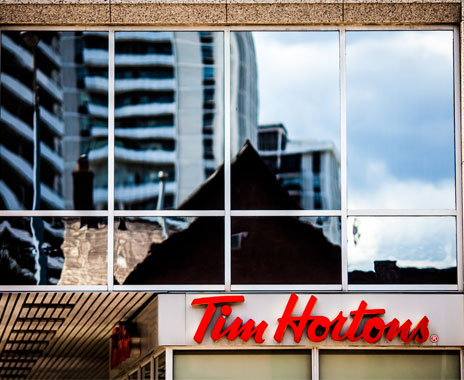Second-quarter financials buzzed for Restaurant Brands International (RBI) Wednesday thanks to stellar sales from Burger King. Yet company executives spent a large period of Wednesday’s conference call addressing sagging performance at Tim Hortons, the iconic Canadian chain that has ignited franchisee controversy in recent months.
Comparable same-store sales jumped 3.9 percent at Burger King, year-over-year, and 2.7 percent at RBI’s most recent acquisition, Popeyes Louisiana Kitchen. Sales fell 0.8 percent at Tim Hortons.
This decline, RBI CEO Daniel Schwartz said in the call, was primarily driven by the brand’s performance in Canada, where comparable sales fell 0.6 percent. Softness can be credited to limited-time offers that didn’t hit, he added. These include Nutella products and summer cold beverage lineups.
To turn things around, Tim Hortons launched espresso-based beverages in April, which Schwartz believes will “be a growth catalyst in the months and many years to come.” He said Tim Hortons more than doubled espresso-based beverage unit sales by the end of the quarter.
On Wednesday morning, RBI also announced it signed a joint venture deal to develop Tim Hortons in Spain. Details of a timeline and exact growth were not shared.
On that note, Josh Kobza, RBI’s chief financial officer, said Tim Hortons has made progress in the last 12—18 months growing its global footprint, setting up new partnerships in the Philippines, U.K., and Mexico.
“I think we’ve made a lot of great progress that’s setting the foundation for making Tim’s a global brand, and opening up very high-quality restaurants,” he said. “[It’s] showing us that the Tim Hortons brand really does resonate all around the world.”
One question RBI chose not to speculate on was a franchisee dispute in Canada. In June, The Great White North Franchisee Association announced it was seeking a $500 million class-action lawsuit against RBI. It claimed the parent company was funneling money from franchisees toward interests unrelated to the brand. RBI denied the allegations.
Also in June, Tim Hortons president Elias Dias Sese stepped down and moved into the role of president of international expansion. Schwartz took over his responsibilities.
Regardless of the modest sales and recent movement, Schwartz said RBI is “more excited about the potential for [Tim Hortons in] Canada today probably than ever before.”
“We’re always trying to deliver a best-in-class Tim Hortons experience for all of our guests and we do have a positive outlook for the balance of the year across multiple day parts,” Kobza added.
The performance of Burger King and Popeyes kept shares of RBI trending upward throughout the day.
Schwartz pointed to the prowess of Burger King’s premium burgers line—the Bacon King, Steakhouse King, and Mushroom & Swiss King. Other innovative, and successful, product launches such as the Chicken Parmesan Sandwich, Fruit Loop and Lucky Charms shakes, 89-cent pancakes, Mac-n-Cheetos, and improved Crispy Chicken Sandwich boosted the bottom line.
“[It’s] a nice balance of value and premium, and at the same time driving continued improvements in guest experience with respect to operations and store renovations,” Schwartz said.
Restaurant Brands’ sales increased to $1.13 billion in the quarter, up from $1.04 billion the year prior. The adjusted net profit was 51 cents per share, which beat Thomson Reuters estimates of 45 cents per share.
RBI’s March purchase of Popeyes for $1.8 billion continues to take form. Schwartz said RBI “made good progress on our integration efforts” in the second quarter, which included announcing a brand leadership team and reorganizing the business to align with RBI’s priorities.
“We’re already growing at a fast pace in the U.S., and we think there is an opportunity to do it even more there,” Kobza said of Popeyes’ development. “And perhaps even more around the world [where] the Chicken category globally is a very attractive one. We see no reason why we can’t be growing much, much faster.”










